Open Letter to the TPP decision-makers
By InternetNZ, 22 November 2013 No Comments
Theo: http://fairdeal.net.nz/2013/11/open-letter-to-the-tpp-decision-makers
Bài được đưa lên Internet ngày: 22/11/2013
Lời người dịch: Liên minh Hiệp định Công bằng (Fair Deal Coalition) với vài chục tổ chức là các thành viên, đã gửi bức thư ngỏ cho những người ra quyết định về TPP của New Zealand nói về các yêu cầu mà họ muốn đạt được nếu TPP được ký kết. Có thể rất hữu ích cho các hội, hiệp hội, tổ chức của Việt Nam có quan tâm tới các vấn đề của TPP tham khảo. Xem thêm: TPP, ACTA, bằng sáng chế phần mềm và hơn thế nữa.
Đối với các đại diện của chính phủ có trách nhiệm về Hiệp định Xuyên Thái bình dương – TPP:
Văn bản từ chương các Quyền Sở hữu trí tuệ của TPP mà WikiLeaks làm rò rỉ gần đây khẳng định nỗi sợ hãi của Liên minh Hiệp định Công bằng (Fair Deal Coalition) rằng TPP quả thực sẽ hạn chế Internet mở, sự truy cập tới tri thức, cơ hội kinh tế và các quyền cơ bản, nếu một số điều khoản bản quyền được đề xuất được đồng ý.
Để đảm bảo một hiệp định công bằng cho tất cả các nước và các bên tham gia đóng góp, chúng tôi yêu cầu rằng:
Thời hạn bản quyền nên được các luật nội địa của một nước xác định và các hiệp định quốc tế mà họ đã đồng ý theo. TPP nên không ép các quốc gia mở rộng các thời hạn bản quyền; các nước nên được khuyến khích để thúc đẩy một miền công cộng giàu có, không được yêu cầu phải bó hẹp nó. Thời hạn bản quyền quá lâu có thể không khuyến khích sự truy cập tới thông tin và đổi mới, và vô tình cản trở sự tái phát hiện các tác phẩm không còn in được hoặc chưa được sử dụng.
Nên không cấm trong nhập khẩu song song. TPP nên hạ thấp các rào cản thương mại, không nâng chúng lên cao, những các điều khoản trong chương bị rò rỉ có thể trao cho những người nắm giữ quyền sức mạnh để ngăn cản các nhập khẩu song song các tác phẩm của họ. Hơn nữa một số quốc gia đang tranh luận chống lại một điều khoản mà có thể khuyến khích sự thừa nhận sự cạn kiệt các quyền quốc tế. Các nhập khẩu song song làm giảm giá thành và làm gia tăng tính sẵn sàng của các tác phẩm có bản quyền và nên được cho phép.
Sử dụng các tác phẩm có bản quyền một cách trung thực và công bằng nên không bị trói vì các khóa số. Các đề xuất có liên quan tới các khóa số (cũng được biết như là các biện pháp bảo vệ công nghệ hoặc TPM – technological protection measure) có thể xung đột với các sử dụng các tác phẩm có bản quyền nếu không được pháp luật cho phép. Ví dụ, các khóa số nên không được sử dụng để ngăn cản người mù khỏi việc truy cập các tác phẩm có bản quyền, chúng cũng không nên khóa sự truy cập hợp lý tới các tư liệu giáo dục hoặc làm giảm sự lựa chọn của người tiêu dùng. Các luật TPM cho thế kỷ 21 nên được thích ứng với một môi trường số tiến hóa nhanh và cho phép sử dụng công bằng các tác phẩm.
Truy cập tới Internet nên được khuyến khích như là cơ bản cho việc tham gia trong xã hội thế kỷ 21. Các hiệp định thương mại phải không yêu cầu chấm dứt sự truy cập Internet vì vi phạm bản quyền. Liên hiệp quốc đã thừa nhận tầm quan trọng của Internet đối với các quyền con người. Sự kết thúc truy cập Internet đối với một hộ gia đình hoặc doanh nghiệp có thể cắt người ngụ cư khỏi giáo dục, việc làm, các dịch vụ y tế, thông tin chính phủ và sự tham gia vào xã hội.
Tóm lại, chúng tôi khuyến khích:
Thúc đẩy sự truy cập tới tri thức, sự đổi mới, và cơ hội kinh tế. Tôn trọng các quyền cơ bản như theo thủ tục, tính riêng tư và tự do ngôn luận. Nhận thức được về các thực tiễn và cơ hội của Internet.
Chúng tôi là ai
Giữa chúng tôi, chúng tôi đại diện cho những lợi ích của những người sử dụng Internet, các trường học, các đại học, các nghệ sĩ, các thư viện và kho lưu trữ, những người mù và khuyết tật, những người tiêu dùng, các hãng công nghệ thông tin, các doanh nghiệp Internet, và những người tin tưởng vào sức mạnh của phần mềm nguồn mở và Internet mở. Chúng tôi bao gồm các nhóm của giới công nghiệp, những người bảo vệ các quyền số, các viện sĩ hàn lâm và các tổ chức quyền con người.
Chúng tôi, các tổ chức ký tên dưới đây, yêu cầu về một hiệp định công bằng về bản quyền trong TPP.
Như một liên minh đại diện cho một sự đa dạng các lợi ích, chúng tôi kêu gọi các bên TPP từ chối các đề xuất bản quyền mà có thể hạn chế Internet mở, truy cập tới tri thức, cơ hội kinh tế và các quyền cơ bản.
Như một nhóm chúng tôi là đa dạng, nhưng chúng tôi chia sẻ một điều chung: Chúng tôi tìm kiếm các luật sở hữu trí tuệ phù hợp và cân bằng mà xúc tác cho nhiều lĩnh vực xã hội tiến hành việc kinh doanh, truy cập thông tin, giáo dục và đổi mới. Bạn có thể biết nhiều hơn về Liên minh Hiệp định Công bằng Quốc tế và các thành viên của nó ở tại: http://ourfairdeal.org/#/About_Us
Chân thành,
Liên minh Hiệp định Công bằng (The Fair Deal Coalition)
Các thành viên của Liên minh Hiệp định Công bằng bao gồm:
Affinity Bridge, Article 19, Australian Digital Alliance, Australian Library & Information Association, Association for Progressive Communications, Internet New Zealand, BCFIPA, The Canadian Internet Policy and Public Interest Clinic, Consumers International, ConsumerNZ, Council of Canadians, Creative Freedom, Demand Progress, Derechos Digitales, Electronic Frontiers Australia, Electronic Frontiers Foundation, Engine.is, Fight for the Future, FreePress, Gen Why Media, Hiperderecho, Library & Information Society of New Zealand, Movements for the Internet Active Users, NZRise, NZ Open Source Society, OpenMedia.org, Public Citizen, Public Knowledge, Royal New Zealand Foundation of the Blind, Scoop, Tech Liberty New Zealand, TechDirt, Telecommunications Users Association of NZ, Tucows and TradeMe.
To the government representatives responsible for the Trans-Pacific Partnership Agreement (TPP):
Text f-rom the TPP Intellectual Property Rights chapter recently released by Wikileaks confirms the Fair Deal Coalition’s fears that the TPP would indeed limit the open Internet, access to knowledge, economic opportunity and fundamental rights, if a number of proposed copyright provisions were agreed to.
To ensure A Fair Deal for all countries and stakeholders, we ask that:
The term of copyright should be determined by a country’s domestic laws and the international agreements they have agreed to. The TPP should not force countries to extend copyright terms; countries should be encouraged to promote a rich public domain, not required to shrink it. Copyright terms that are too long can discourage access to information and innovation, and inadvertently prevent the re-discovery of out-of-print or unused works.
There should be no ban on parallel imports. The TPP should lower trade barriers, not raise them, but provisions in the leaked chapter would give rightsholders the power to prevent parallel imports of their works. Further some countries are arguing against a provision that would encourage the recognition of international exhaustion of rights. Parallel imports decrease the price and increase the availability of copyright works and should be permitted.
Fair and genuine uses of copyright works should not be blocked by digital locks. Proposals relating to digital locks (also known as technological protection measures or TPMs) would conflict with uses of copyright works otherwise permitted by law. For instance, digital locks should not be used to prevent the blind f-rom accessing copyright works, nor should they block reasonable access to educational materials or reduce consumer choice. TPM laws for the 21st century should be adaptable to a rapidly evolving digital environment and allow fair uses of works.
Access to the Internet should be promoted as fundamental to participating in 21st century society. Trade agreements must not require termination of Internet access for infringement of copyright. The United Nations has recognised the importance of the Internet to human rights. Termination of Internet access to a household or business would cut off occupants f-rom education, employment, health services, government information, and social engagement.
In summary, we encourage:
The promotion of access to knowledge, innovation, and economic opportunity.
Respect for fundamental rights like due process, privacy, and free speech.
Recognition of the realities and opportunities of the Internet.
Who we are
Between us we represent the interests of Internet users, schools, universities, artists, libraries and archives, the blind and vision impaired, consumers, information technology firms, Internet businesses, and those who believe in the power of open source software and the open Internet. We include industry groups, digital rights advocates, academics and human rights organisations.
We, the undersigned organizations, ask for A Fair Deal on copyright in the TPP.
As a coalition representing a diversity of interests, we call on TPP parties to reject copyright proposals that would limit the open internet, access to knowledge, economic opportunity and fundamental rights.
As a group we are diverse, but we share one thing in common: We seek appropriately-balanced intellectual property laws that enable many sectors of society to conduct business, access information, educate, and innovate. You can learn more about the International Fair Deal coalition and it’s members at: http://ourfairdeal.org/#/About_Us
Sincerely,
The Fair Deal Coalition
Members of the Fair Deal coalition include:
Affinity Bridge, Article 19, Australian Digital Alliance, Australian Library & Information Association, Association for Progressive Communications, Internet New Zealand, BCFIPA, The Canadian Internet Policy and Public Interest Clinic, Consumers International, ConsumerNZ, Council of Canadians, Creative Freedom, Demand Progress, Derechos Digitales, Electronic Frontiers Australia, Electronic Frontiers Foundation, Engine.is, Fight for the Future, FreePress, Gen Why Media, Hiperderecho, Library & Information Society of New Zealand, Movements for the Internet Active Users, NZRise, NZ Open Source Society, OpenMedia.org, Public Citizen, Public Knowledge, Royal New Zealand Foundation of the Blind, Scoop, Tech Liberty New Zealand, TechDirt, Telecommunications Users Association of NZ, Tucows and TradeMe.
Dịch: Lê Trung Nghĩa
Ý kiến bạn đọc
Những tin mới hơn
Những tin cũ hơn
Blog này được chuyển đổi từ http://blog.yahoo.com/letrungnghia trên Yahoo Blog sang sử dụng NukeViet sau khi Yahoo Blog đóng cửa tại Việt Nam ngày 17/01/2013.Kể từ ngày 07/02/2013, thông tin trên Blog được cập nhật tiếp tục trở lại với sự hỗ trợ kỹ thuật và đặt chỗ hosting của nhóm phát triển...
 DigComp 3.0: Khung năng lực số châu Âu
DigComp 3.0: Khung năng lực số châu Âu
 Các bài toàn văn trong năm 2025
Các bài toàn văn trong năm 2025
 Các bài trình chiếu trong năm 2025
Các bài trình chiếu trong năm 2025
 Các lớp tập huấn thực hành ‘Khai thác tài nguyên giáo dục mở’ tới hết năm 2025
Các lớp tập huấn thực hành ‘Khai thác tài nguyên giáo dục mở’ tới hết năm 2025
 Tập huấn thực hành ‘Khai thác tài nguyên giáo dục mở’ cho giáo viên phổ thông, bao gồm cả giáo viên tiểu học và mầm non tới hết năm 2025
Tập huấn thực hành ‘Khai thác tài nguyên giáo dục mở’ cho giáo viên phổ thông, bao gồm cả giáo viên tiểu học và mầm non tới hết năm 2025
 Các tài liệu dịch sang tiếng Việt tới hết năm 2025
Các tài liệu dịch sang tiếng Việt tới hết năm 2025
 Loạt bài về AI và AI Nguồn Mở: Công cụ AI; Dự án AI Nguồn Mở; LLM Nguồn Mở; Kỹ thuật lời nhắc;
Loạt bài về AI và AI Nguồn Mở: Công cụ AI; Dự án AI Nguồn Mở; LLM Nguồn Mở; Kỹ thuật lời nhắc;
 Tổng hợp các bài của Nhóm các Nhà cấp vốn Nghiên cứu Mở (ORFG) đã được dịch sang tiếng Việt
Tổng hợp các bài của Nhóm các Nhà cấp vốn Nghiên cứu Mở (ORFG) đã được dịch sang tiếng Việt
 Tổng hợp các bài của Liên minh S (cOAlition S) đã được dịch sang tiếng Việt
Tổng hợp các bài của Liên minh S (cOAlition S) đã được dịch sang tiếng Việt
 Năm Khoa học Mở & Chuyển đổi sang Khoa học Mở - Tổng hợp các bài liên quan
Năm Khoa học Mở & Chuyển đổi sang Khoa học Mở - Tổng hợp các bài liên quan
 Bàn về 'Lợi thế của doanh nghiệp Việt là dữ liệu Việt, bài toán Việt' - bài phát biểu của Bộ trưởng Nguyễn Mạnh Hùng ngày 21/08/2025
Bàn về 'Lợi thế của doanh nghiệp Việt là dữ liệu Việt, bài toán Việt' - bài phát biểu của Bộ trưởng Nguyễn Mạnh Hùng ngày 21/08/2025
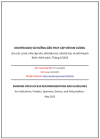 ‘KHUYẾN NGHỊ VÀ HƯỚNG DẪN TRUY CẬP MỞ KIM CƯƠNG cho các cơ sở, nhà cấp vốn, nhà bảo trợ, nhà tài trợ, và nhà hoạch định chính sách’ - bản dịch sang tiếng Việt
‘KHUYẾN NGHỊ VÀ HƯỚNG DẪN TRUY CẬP MỞ KIM CƯƠNG cho các cơ sở, nhà cấp vốn, nhà bảo trợ, nhà tài trợ, và nhà hoạch định chính sách’ - bản dịch sang tiếng Việt
 50 công cụ AI tốt nhất cho năm 2025 (Đã thử và kiểm nghiệm)
50 công cụ AI tốt nhất cho năm 2025 (Đã thử và kiểm nghiệm)
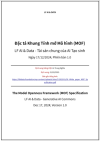 ‘Đặc tả Khung Tính mở Mô hình (MOF)’ của LF AI & Data - Tài sản chung của AI Tạo sinh - bản dịch sang tiếng Việt
‘Đặc tả Khung Tính mở Mô hình (MOF)’ của LF AI & Data - Tài sản chung của AI Tạo sinh - bản dịch sang tiếng Việt
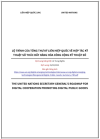 ‘LỘ TRÌNH CỦA TỔNG THƯ KÝ LIÊN HIỆP QUỐC VỀ HỢP TÁC KỸ THUẬT SỐ THÚC ĐẨY HÀNG HÓA CÔNG CỘNG KỸ THUẬT SỐ’ - bản dịch sang tiếng Việt
‘LỘ TRÌNH CỦA TỔNG THƯ KÝ LIÊN HIỆP QUỐC VỀ HỢP TÁC KỸ THUẬT SỐ THÚC ĐẨY HÀNG HÓA CÔNG CỘNG KỸ THUẬT SỐ’ - bản dịch sang tiếng Việt
 AI trong TVET - Một vài gợi ý triển khai trong thực tế
AI trong TVET - Một vài gợi ý triển khai trong thực tế
 Tọa đàm ‘Vai trò của Tài nguyên Giáo dục Mở trong chuyển đổi số giáo dục đại học’ tại Viện Chuyển đổi số và Học liệu - Đại học Huế, ngày 12/09/2025
Tọa đàm ‘Vai trò của Tài nguyên Giáo dục Mở trong chuyển đổi số giáo dục đại học’ tại Viện Chuyển đổi số và Học liệu - Đại học Huế, ngày 12/09/2025
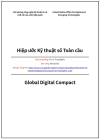 ‘Hiệp ước Kỹ thuật số Toàn cầu’ của Liên hiệp quốc - bản dịch sang tiếng Việt
‘Hiệp ước Kỹ thuật số Toàn cầu’ của Liên hiệp quốc - bản dịch sang tiếng Việt
 12 dự án AI Nguồn Mở hàng đầu để bổ sung vào kho công nghệ của bạn. 11. Hugging Face Transformers
12 dự án AI Nguồn Mở hàng đầu để bổ sung vào kho công nghệ của bạn. 11. Hugging Face Transformers
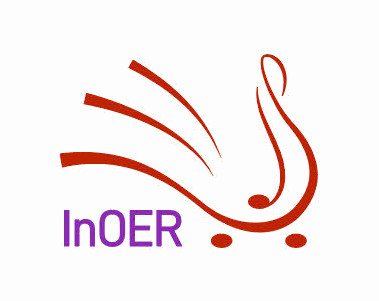 Dự án DIAMAS đưa ra Khuyến nghị và Hướng dẫn Truy cập Mở Kim cương
Dự án DIAMAS đưa ra Khuyến nghị và Hướng dẫn Truy cập Mở Kim cương
 50 công cụ AI tốt nhất cho năm 2025 (Đã thử và kiểm nghiệm) - Trợ lý AI tốt nhất (chatbots)
50 công cụ AI tốt nhất cho năm 2025 (Đã thử và kiểm nghiệm) - Trợ lý AI tốt nhất (chatbots)
 Hướng dẫn kỹ thuật lời nhắc. Kỹ thuật viết lời nhắc. Lời nhắc Tái Hành động (ReAct)
Hướng dẫn kỹ thuật lời nhắc. Kỹ thuật viết lời nhắc. Lời nhắc Tái Hành động (ReAct)
 50 công cụ AI tốt nhất cho năm 2025 (Đã thử và kiểm nghiệm) - Trình tạo nhạc AI tốt nhất
50 công cụ AI tốt nhất cho năm 2025 (Đã thử và kiểm nghiệm) - Trình tạo nhạc AI tốt nhất
 Nâng cao tính mở và khả năng sử dụng của Hàng hóa Công cộng Kỹ thuật số bằng cách chỉ chấp nhận các bộ sưu tập nội dung và bộ dữ liệu hoàn toàn được cấp phép mở
Nâng cao tính mở và khả năng sử dụng của Hàng hóa Công cộng Kỹ thuật số bằng cách chỉ chấp nhận các bộ sưu tập nội dung và bộ dữ liệu hoàn toàn được cấp phép mở
 Vì sao Singapore đang xây dựng hàng hóa công cộng kỹ thuật số
Vì sao Singapore đang xây dựng hàng hóa công cộng kỹ thuật số
 50 công cụ AI tốt nhất cho năm 2025 (Đã thử và kiểm nghiệm) - Công cụ AI quản lý kiến thức tốt nhất
50 công cụ AI tốt nhất cho năm 2025 (Đã thử và kiểm nghiệm) - Công cụ AI quản lý kiến thức tốt nhất
 Hiểu các giấy phép CC và đào tạo AI: Một tóm tắt về pháp lý
Hiểu các giấy phép CC và đào tạo AI: Một tóm tắt về pháp lý
 Hướng dẫn nghiên cứu của khoa về ChatGPT và các công cụ AI
Hướng dẫn nghiên cứu của khoa về ChatGPT và các công cụ AI
 Chiến lược 2023-2028 của DPGA
Chiến lược 2023-2028 của DPGA
 Các công cụ pháp lý CC được thừa nhận là Hàng hóa Công cộng Kỹ thuật số
Các công cụ pháp lý CC được thừa nhận là Hàng hóa Công cộng Kỹ thuật số